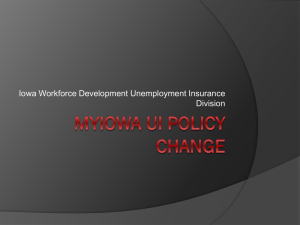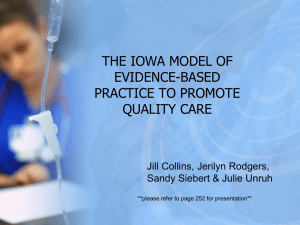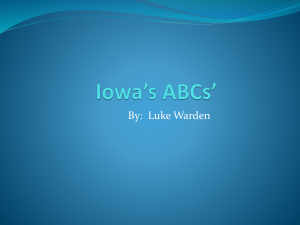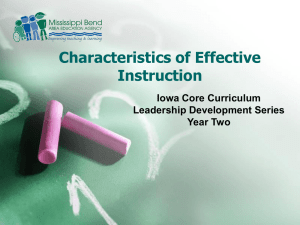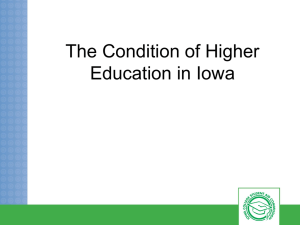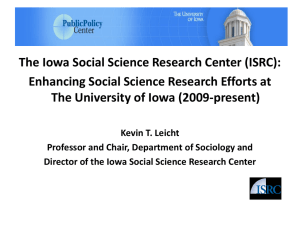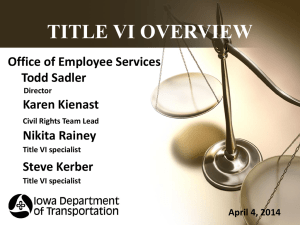Stanley - Americans for a Clean Energy Grid
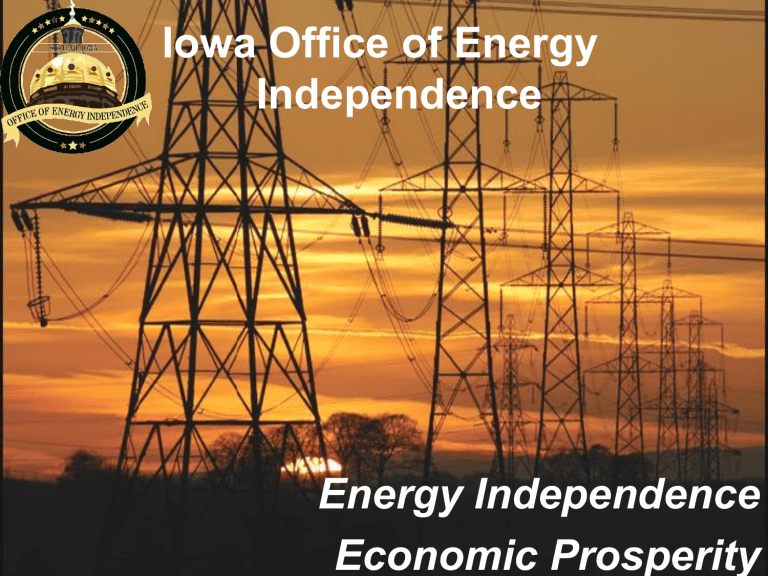
Iowa Office of Energy
Independence
Energy Independence
Economic Prosperity
Iowa’s Energy Economics
$5.25 billion, or 37% of Iowa’s energy expenditures, accumulated to economies of other states or countries.
The money Iowans spent on renewable energy including wind, hydropower and ethanol, amounted to a total of $427.6 million.
Using Iowa-based energy resources kept
$133.5 million circulating in the state economy that would have gone elsewhere if it had been used to purchase fossil energy.
Economic & Energy Independence
There are 3 ways to keep or make more money for Iowa
Increase Iowa’s use of instate energy resources
Increase Iowa’s export of renewable energy
Increase Iowa’s overall energy efficiency
Wind in Iowa is big business
Iowa Wind Industry Today
SIEMENS
S5
Sector
Five
Technologies
… plus more than 200 existing Iowa manufacturers in the supply chain
Policy As A Pump Primer
Today
Iowa is currently #1 in the country in wind generation output as a percentage of all electricity generation in the state
17-20% of all electricity generated in Iowa is from wind
Current installed wind capacity of 3,670 MW
Why?
Advanced ratemaking principles are available for wind projects
Federal and State Tax Credits
Transmission infrastructure and location near load centers
Excellent location and high capacity factor
Experience with RPS
Iowa Power Fund
Iowa Power Fund: The Vision
Do what we do well
Create an irreversible momentum in energy
Create permanent
Iowa jobs
Iowa Power Fund: The Facts
Created in 2007
$100 Million Fund
Focused on:
Research & Development
Early Stage
Commercialization
Education
To date, the Iowa Power Fund has allocated $40.5 million for
32 projects in Iowa. These projects have leveraged more than $271 million in additional funds.
Power Fund: The Facts
The Iowa Power Fund was also tapped to assist with flood recovery, allocating $7.5 million to help homeowners and businesses to rebuild with energy efficient equipment and materials.
Beginning in 2010, 4%, or more than $800,000 per year, of the Iowa Power Fund appropriation was earmarked to fund competitive projects for community energy efficiency and renewable energy investments.
The Iowa Power Fund provides approximately $2.5 million annually to community colleges for energyrelated curriculum delivery and development.
Power Fund Wind Projects
Research & Development
Iowa Alliance for Wind Innovation &
Novel Development (IAWIND)
Iowa Stored Energy Park
Carbon-Free Energy
Commercialization
TPI Composites
Acciona Windpower North America
There Is More To Know About
Wind Turbine Blades
TPI: Advanced Wind Blade
Manufacturing
This project is working to foster the more efficient mass production of wind turbines in
Iowa
By improving labor productivity in wind manufacturing up to 35%, this project will increase manufacturing throughput
This will result in more employment opportunities in Iowa, along with betterpaying and technically-challenging employment possibilities
Today Iowa agribusiness feeds, fuels and secures our society
POET: Project LIBERTY
Project LIBERTY in Emmetsburg, Iowa will be one of the world’s first commercial scale cellulosic bio-refineries
Convert corn cobs to ethanol through enzymatic hydrolysis
Corn cobs are easy to harvest, have limited environmental impact and have high carbohydrate content that makes more ethanol
Will help to meet the vision of producing 36 billion gallons of ethanol a year
Algae can be an affordable biofuels feedstock
Green Plains Renewable
Energy & Bioprocess Algae
This project is using breakthrough technology for the mass production of algae as a fuel feedstock
The inputs for the mass production of algae are the waste products from an ethanol plant: carbon dioxide and waste water.
With this level of production, a
50 million gallon a year ethanol plant would produce enough oil for 5.8 million gallons of biodiesel annually.
Energy Leadership Starts in
Communities
Dubuque: Model for Energy
Efficiency and Economic Growth
The City of Dubuque is creating an Integrated
Sustainability Service model for measurement and monitoring of its energy and water systems, infrastructure components, and transportation networks with assistance from IBM
This system will allow City management and electric utility customers to track:
energy use on a near real-time basis, and the impact information about usage on actual use patterns
This will help the City and its citizens understand electric consumption and the sustainability footprint of the community, as well as provide cross-analytics for all related areas of energy consumption within the community
Iowa’s Energy Independence Plan
2007
Creation of the
Iowa Power Fund
2007 - 2025
Achieve Key Goals for Iowa
2007
Optimize
Energy Use
• 30% increase in energy efficiency
• 10% decrease in vehicle miles traveled
Fully Develop
Iowa’s
Renewable
Energy
Potential
• 10,000 MW of wind
Installed in Iowa
2025
Maximize the
Development & Use of
Biofuels
• Increase Iowan’s use of biofuels to 50%
• Meet future low carbon fuel standards
National Plan Goals:
DOE 20% Wind by 2030
What the report means for Iowa:
10 + GW build out
Currently at: 3,670 MW
Balance needed: 6,330 MW
1-2GW can come only with nominal investment in Transmission
Solution: Interconnect wide EHV
Overlay
Barriers
Transmission limitations are the greatest obstacle to realizing the economic, environmental, and energy security benefits available from wind
(U.S. DOE).
Lack of transmission capacity across that nation is holding up economic development
Over 300,000 MW of wind projects across the U.S. are on hold
Concerns of adequate transmission nationwide are shared by solar, geothermal, and hydropower industries.
56% of major transmission lines in Iowa are over 35 years old
Transmission Upgrades
One version of interstate backbone system is estimated at $60B spread over 10-20 years
Transmission accounts for 10% of total electrical delivery costs
An updated national transmission grid will provide:
Thousands of good jobs, plus many more indirect
Reduced carbon emissions
Iowa’s Work on Transmission
Issues
Governor’s Wind Energy Coalition (GWEC)
26 states represented
Upper Midwest Transmission Development
Initiative (UMTDI)
Governor’s level initiative in 5 states
Eastern Interconnect States Planning
Council (EISPC)
39 states plus the District of Columbia & City of
New Orleans
GWEC Recommendations
Adopt a renewable electricity standard
Develop new interstate electric transmission system infrastructure for renewable energy resources both on-shore and offshore
Support coastal, deep water, and offshore wind energy technology and transmission research and development
Streamline permitting processes for both offshore and on-shore wind energy development projects
Expand the U.S. Department of Energy’s work with the states and the wind industry to accelerate innovation
Extend the treasury department grant program in lieu of the investment tax credit, and adopt a long-term renewable energy production tax credit with provisions to broaden the pool of eligible investors
UMTDI
Two working groups:
Cost allocation
Transmission
Seeking a regional solution to transmission
Report recently issued
Proposes cost allocation strategy
Working in coordination with MISO’s Regional Generation
Outlet Study (RGOS) to best determine wind resources to build to; similar to CREZ in Texas
Eastern Interconnection States'
Planning Council (EISPC)
Goal to develop plans for eastern interconnect-wide transmission system for renewables access
Two representatives from each state
State Energy Office (Roya Stanley)
Utilities Board (Rob Bernsten)
Received $14 million for planning from
DOE
States
• Regional Policy recommendations
• State energy policies
• Rate Policies
Eastern Interconnection Planning Collaborative
• Rolls-up regional plans
• Coordinates with Canada, Western Interconnect and ERCOT
• Receives stakeholder input and holds public meetings
• Performs studies of various transmission alternatives against national, regional and state energy/economic/environmental
Publishes Annual
Interconnection objectives
• Identifies gaps for further study
Analysis
Annual interconnection analysis
Provides policy direction, assumptions & criteria
Regional/state compliant plans provided as input
Study gaps relative to national, regional and state policy
DOE/FERC FERC
• Review/direction
• Order adjustments
States
• Policy recommendations
• State energy plans
Regional
Plans and
Projects
ISO / RTOs & Order 890 Entities
•Produce Regional Plan through regional stakeholder process, including state regulatory authorities
EISPC
Deliverables
Conduct studies on key issues and prepare whitepapers on energy efficiency, renewables, nuclear siting, coal potential, energy storage, prices, and more
Identify potential locations of low or no carbon generation
Provide insight into economic and environmental implications
Attempt to achieve consensus on modeling inputs and future scenarios
How We Will Know When
We’ve Completed Our Mission
“ We want to live in a healthy place where our families and friends have rewarding careers, comfortable places to live, clean air and water, and abundant opportunities for the future .” –
Roya Stanley, Director
Iowa Office of Energy
Independence
